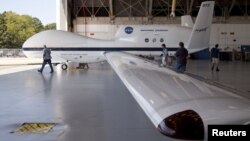The Obama administration has formally proposed the sale of advanced spy drones to South Korea, in a push to boost the Seoul government's ability to protect itself from attacks by the heavily-militarized North.
The U.S. Defense Security Cooperation Agency said in a statement that it has officially notified Congress of the proposed $1.2 billion deal for four high-altitude Global Hawk remotely piloted aircraft, as well as training and logistical support. Analysts say congressional approval is likely.
Brad Glosserman, an analyst with an Hawaii-based security research group, said the South's new drone program will fill a gap in its ability to monitor security developments in North Korea.
"Rather than relying on human intelligence on the ground, which in North Korea is extremely difficult, or satellite intelligence, which is essentially dependent on the ability to put a bird in the air and get it over your targets at the appropriate time. You know absent that, the South Koreans are blind," said Glosserman. "And so what a drone offers you is the ability to get something up in real time, to control it more directly, and to get the information you hopefully need, much more quickly, and much more reliable fashion."
Glosserman said the move is in response to Pyongyang's recent launch of a long-range rocket that placed a satellite in orbit, which he said was an "intelligence failure" on the part of Seoul. South Korea has not yet officially committed to buying the drones.
The White House called the launch a "highly provocative act." Since then, some analysts say Pyongyang may have developed its ballistic missile capability to the point of reaching as far away as the U.S. mainland.
The Global Hawk, with its cloud-penetrating radar, carries high-resolution digital cameras and infrared sensors. It reportedly is capable of detecting an object less than 30 centimeters in length from an altitude of about 20 kilometers.
Plans call for South Korea to take over operational control of its troops from the United States in 2015, and the security agency says Seoul will "have no difficulty absorbing these systems into its armed forces." The current system of U.S. control grew out of the U.S. role in the 1950-1953 Korean war, which halted a North Korean push to take control of the South.
The U.S. Defense Security Cooperation Agency said in a statement that it has officially notified Congress of the proposed $1.2 billion deal for four high-altitude Global Hawk remotely piloted aircraft, as well as training and logistical support. Analysts say congressional approval is likely.
Brad Glosserman, an analyst with an Hawaii-based security research group, said the South's new drone program will fill a gap in its ability to monitor security developments in North Korea.
"Rather than relying on human intelligence on the ground, which in North Korea is extremely difficult, or satellite intelligence, which is essentially dependent on the ability to put a bird in the air and get it over your targets at the appropriate time. You know absent that, the South Koreans are blind," said Glosserman. "And so what a drone offers you is the ability to get something up in real time, to control it more directly, and to get the information you hopefully need, much more quickly, and much more reliable fashion."
Glosserman said the move is in response to Pyongyang's recent launch of a long-range rocket that placed a satellite in orbit, which he said was an "intelligence failure" on the part of Seoul. South Korea has not yet officially committed to buying the drones.
The White House called the launch a "highly provocative act." Since then, some analysts say Pyongyang may have developed its ballistic missile capability to the point of reaching as far away as the U.S. mainland.
The Global Hawk, with its cloud-penetrating radar, carries high-resolution digital cameras and infrared sensors. It reportedly is capable of detecting an object less than 30 centimeters in length from an altitude of about 20 kilometers.
Plans call for South Korea to take over operational control of its troops from the United States in 2015, and the security agency says Seoul will "have no difficulty absorbing these systems into its armed forces." The current system of U.S. control grew out of the U.S. role in the 1950-1953 Korean war, which halted a North Korean push to take control of the South.





